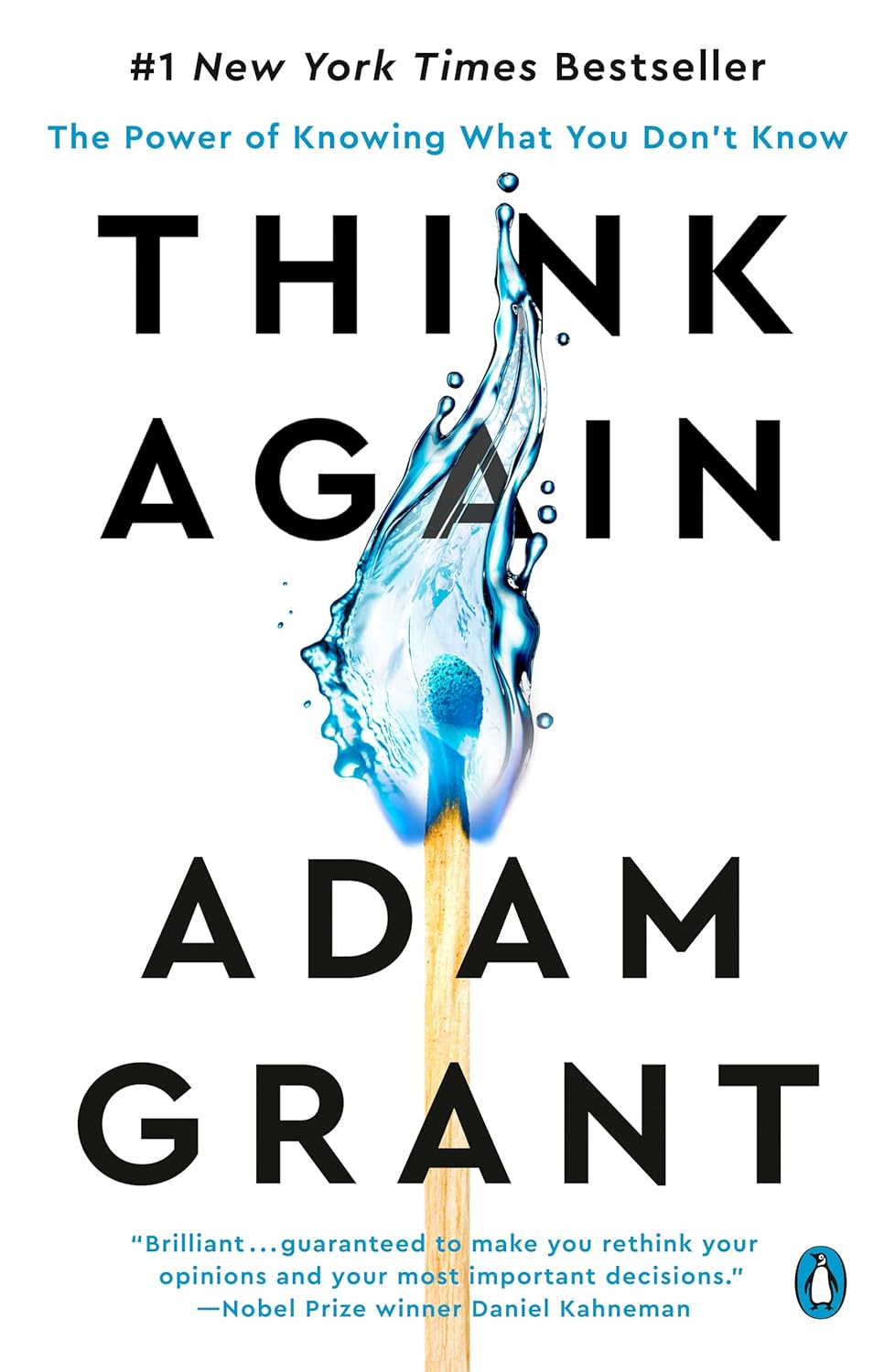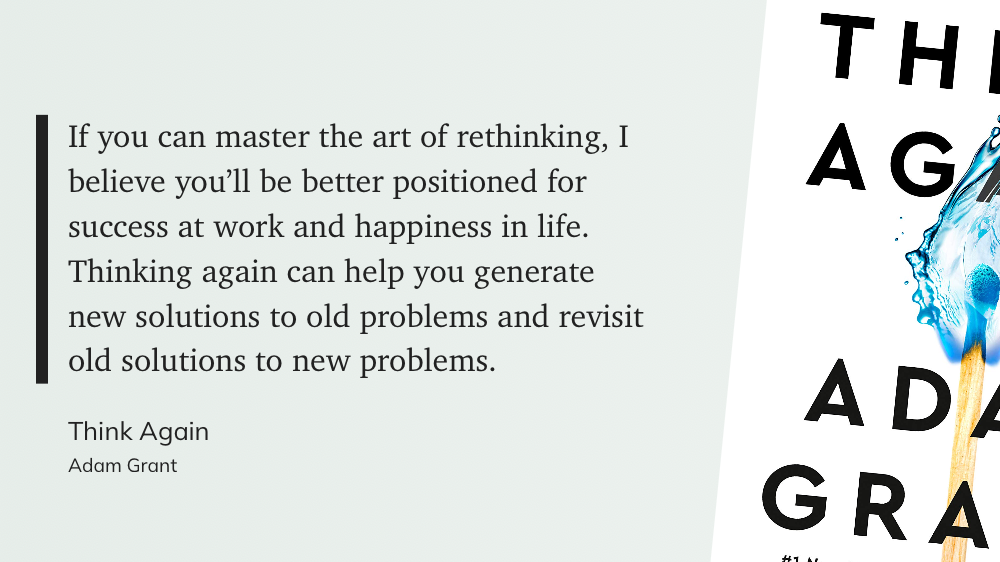
Adam Grant’s Think Again: The Power of Knowing What You Don’t Know is an enlightening and deeply engaging exploration of the art and science of rethinking. As a celebrated organizational psychologist, Grant skillfully dissects the mental habits that hinder growth and adaptability while advocating for the virtues of intellectual humility, curiosity, and the willingness to challenge one’s own beliefs. This review delves into the core arguments, style, and broader implications of Grant’s work, while critically evaluating its strengths and limitations.
Core Themes and Concepts
At its heart, Think Again is an invitation to embrace a mindset that prioritizes flexibility over rigidity, curiosity over certainty, and learning over defending entrenched opinions. Grant argues that in an ever-changing world, the ability to rethink and unlearn is as important as the ability to think and learn. He organizes the book into three main sections: rethinking on an individual level, fostering rethinking in interpersonal interactions, and promoting rethinking at a societal scale.
Individual Rethinking
Grant begins by examining the psychological obstacles to rethinking. Drawing on compelling research and anecdotes, he identifies three common mental modes that inhibit intellectual flexibility: the Preacher (defending sacred beliefs), the Prosecutor (attacking others’ views), and the Politician (seeking approval). These roles, while familiar and often instinctive, are counterproductive to rethinking. Instead, Grant advocates for adopting the mindset of a Scientist, someone who approaches beliefs as hypotheses to be tested rather than truths to be defended.
Think Again: The Power of Knowing What You Don’t Know offers practical strategies for cultivating this mindset. One of the most impactful suggestions is the concept of “cognitive detachment”—separating one’s identity from one’s opinions. This allows individuals to evaluate ideas more objectively and adapt when presented with new evidence. Grant’s emphasis on intellectual humility—the recognition of the limits of one’s knowledge—is another cornerstone of this section. He persuasively argues that humility is not a sign of weakness but a prerequisite for growth.
.

.
Interpersonal Rethinking
In the second section, Grant shifts focus to how we can encourage others to rethink their perspectives. One standout concept is “motivational interviewing,” a technique borrowed from clinical psychology. Instead of arguing or trying to persuade, this approach involves asking open-ended questions that help others discover their own reasons for change. For instance, rather than confronting a climate change skeptic with data, one might ask, “What evidence would change your mind?” or “How did you come to that conclusion?”
Grant also explores the importance of creating psychological safety in relationships and organizations. By fostering an environment where people feel safe to express doubts and admit mistakes, leaders can cultivate a culture of learning and innovation. The book includes numerous real-world examples, from successful businesses to political movements, illustrating how these principles can be applied effectively.
Societal Rethinking
The final section broadens the lens to examine how rethinking can shape communities and societies. Grant highlights the dangers of “groupthink” and ideological polarization, emphasizing the need for constructive disagreement and diverse perspectives. He champions the role of debate—not as a contest to be won, but as a collaborative process to uncover the truth. A particularly memorable case study is the story of “Superforecasters,” a group of ordinary people who outperformed intelligence analysts by continually revising their predictions based on new information.
Grant also critiques the education system for prioritizing rote learning over critical thinking. He advocates for teaching students how to think rather than what to think, emphasizing skills like questioning assumptions, evaluating evidence, and considering alternative viewpoints. This vision of education aligns with his broader call for a culture that values curiosity and adaptability.
Style and Accessibility
Grant’s writing is characterized by clarity, wit, and a conversational tone that makes complex ideas accessible to a broad audience. He masterfully weaves together insights from psychology, sociology, and behavioral economics with engaging anecdotes from diverse fields such as business, sports, and academia. For example, he recounts the story of Daryl Davis, a Black musician who persuaded dozens of Ku Klux Klan members to leave the organization by engaging them in respectful dialogue. Such stories not only illustrate key points but also add a human element that resonates emotionally with readers.
Think Again: The Power of Knowing What You Don’t Know is also rich in practical takeaways. Each chapter concludes with actionable advice, such as “think like a scientist,” “admit when you don’t know,” and “seek out information that contradicts your views.” These summaries enhance the book’s utility as a guide for personal and professional development.
Strengths and Contributions
One of Think Again: The Power of Knowing What You Don’t Know’s greatest strengths is its timeliness. In an era marked by political polarization, misinformation, and resistance to change, Grant’s call for rethinking feels urgent and necessary. His ability to connect individual behavior with broader societal trends adds depth and relevance to his arguments.
Another strength is the balance between theory and application. While grounded in rigorous research, the book avoids academic jargon and prioritizes real-world relevance. Grant’s use of vivid examples and clear frameworks makes his ideas memorable and easy to implement.
Moreover, Think Again challenges pervasive myths about intelligence and expertise. Grant dismantles the notion that being smart means having all the answers, arguing instead that true intelligence lies in the ability to question, adapt, and learn. This perspective is both empowering and liberating, encouraging readers to view mistakes and uncertainty as opportunities for growth.
Limitations and Critiques
While Think Again is an excellent book, it is not without limitations. One potential critique is that some of the ideas, though compelling, may feel overly familiar to readers well-versed in psychology or self-help literature. Concepts like cognitive biases, the Dunning-Kruger effect, and the value of diverse perspectives have been explored extensively in other works. However, Grant’s synthesis of these ideas and his unique framing ensure that the book still offers fresh insights.
Another limitation is the book’s optimistic tone, which might not fully account for the structural and systemic barriers to rethinking. While Grant’s strategies are valuable, they often assume a level of agency and psychological safety that may not be available to everyone. For instance, in highly hierarchical organizations or polarized communities, fostering open dialogue and challenging norms can be fraught with risks. Addressing these challenges more explicitly would have added nuance to Grant’s arguments.
Finally, the book’s reliance on anecdotal evidence, while engaging, may raise questions about generalizability. Though the stories are carefully chosen to illustrate key points, they may not always capture the complexity or variability of real-world situations.
Broader Implications
The implications of Think Again extend far beyond the individual reader. Grant’s vision of a society that values rethinking has profound implications for education, politics, business, and beyond. By promoting intellectual humility and curiosity, the book offers a blueprint for addressing some of the most pressing challenges of our time, from climate change to misinformation.
For educators, Think Again underscores the importance of teaching critical thinking skills and fostering a love of learning. For leaders, it highlights the value of creating cultures that prioritize adaptability and innovation. And for citizens, it serves as a reminder that rethinking is not just a personal virtue but a collective responsibility.
Conclusion
In Think Again: The Power of Knowing What You Don’t Know, Adam Grant delivers a compelling case for embracing the art of rethinking. Through a combination of rigorous research, engaging storytelling, and actionable advice, he inspires readers to question their assumptions, learn from mistakes, and approach the world with curiosity and humility.
While the book is not without its limitations, its strengths far outweigh its weaknesses. Grant’s insights are timely, thought-provoking, and deeply relevant to the challenges of our era. Whether you are an educator, leader, or lifelong learner, Think Again offers valuable tools for personal and societal transformation. By adopting the mindset of a Scientist and cultivating the habit of rethinking, we can not only navigate a rapidly changing world but also contribute to building a more thoughtful, inclusive, and adaptable society.
Check out Think Again: The Power of Knowing What You Don’t Know on Amazon by clicking here.
About the author

ADAM GRANT is an organizational psychologist at Wharton, where he has been the top-rated professor for seven straight years. A number 1 New York Times bestselling author and one of TED’s most popular speakers, his books have sold millions of copies and been translated into 45 languages, his talks have been viewed over 35 million times, and his podcasts Re:Thinking and WorkLife have been downloaded over 65 million times.
His pioneering research has inspired people to rethink fundamental assumptions about motivation, generosity, creativity, and potential. Adam has been recognized as one of the world’s 10 most influential management thinkers and Fortune’s 40 under 40, and has received distinguished scientific achievement awards from the American Psychological Association, the Academy of Management, and the National Science Foundation.
Check out Adam Grant’s other books on Amazon by clicking here.
If you found this review useful please share it with friends and family and then check out some of our other Book Reviews.
.
.
